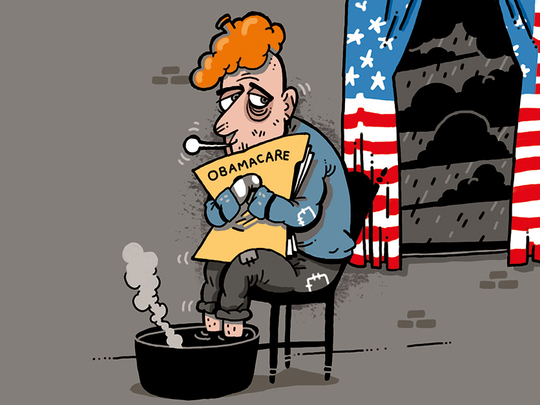
In the wake of last week’s legislative debacle in Washington this seems like a good moment to revisit a topic that often perplexes outsiders trying to make sense of America: its refusal to guarantee health care for its citizens.
Every other rich country on earth does this. Even in a lot of not-especially-rich nations, it is taken for granted that the government has an obligation to provide everyone with at least a basic level of medical care. Why is America so dramatically different?
The focus of this column is Americans and health care, not last week’s political fiasco, but for those who missed it here are the basics:
The Affordable Care Act, more commonly known as ‘Obamacare’, was Barack Obama’s most important domestic policy achievement. During the 13 months it took to pass the bill, Republicans fought it relentlessly. In the seven years since it became law they have campaigned against it at every level of government. Now that they control the presidency along with both houses of Congress Obamacare’s repeal seemed assured.
The replacement plan Republican leaders put forward earlier this month, however, pleased almost no one. Estimates from both inside and outside government showed that, over time, tens of millions of people would lose their health insurance because of it. Moderate Republicans judged this too extreme. GOP hardliners complained that it was not extreme enough.
On Friday both President Donald Trump and Republican congressional leaders conceded that the legislation was dead and said they have no plans to try undoing Obamacare again for the “foreseeable future.” It was the first real political (as opposed to diplomatic, judicial or public-relations) test of Trump’s two-month old presidency and, by any measure, a rather spectacular failure.
But for almost anyone who isn’t American the question remains: Why is this even a subject for debate? Why do so many people in the US reject the very idea of universal health care?
The usual answer is that the US is a hyper-individualistic society where capitalism and the free market are treated with the kind of reverence other people reserve for religion. That’s surely part of it, but there are other factors involved.
The first president to propose a national health system was Theodore Roosevelt in the early 20th century. From his administration through to today, the basic arguments against universal care have not changed much: quality will suffer, it will cost too much and the government is likely to make a mess of it anyway.
That these arguments are often made by people (individual doctors in TR’s time, large hospital companies and insurers today) who are worried less about quality of care than they are about their own incomes does not change the fact that they resonate with many Americans.
They tap into a deep-seated American distrust of government that goes back to the country’s earliest days but has become especially powerful over the last 40 years. Today, vast numbers of Americans across the political spectrum believe the government is rarely, if ever, competent. If this is your starting assumption, it is easy to conclude that however bad the current system may be (and hardly anyone likes America’s current health care system) a government-run replacement would be worse.
The final element is America’s unique link between health care and work. Most working-age Americans who have health insurance receive it through their employers. In a country where the poor and the unemployed are often stigmatised as lazy and irresponsible, this leads many people to conclude that anyone lacking insurance is a freeloader who simply needs to get a job.
In fact, most people who are unemployed aren’t jobless by choice, and many people who are employed either cannot afford insurance or work for companies that do not offer it. There is a wealth of evidence out there to support the statements in that last sentence, but many Americans simply refuse to believe it.
The good news is that attitudes are changing, albeit slowly and tentatively. By international standards, the benefits Obamacare guarantees and the coverage it offers are scandalously inadequate, but for many people they are an improvement on what came before. The result is that Obamacare, for all its faults, may have shifted the terms of discussion.
Most Democrats now believe some level of health care is a right. Few Republicans agree, but some now acknowledge that their constituents have come to expect the basic protections Obamacare offers — and if there is one thing voters do not like it is having benefits taken away.
This explains why a growing number of Republicans still demand Obamacare’s repeal, but also insist that it be replaced with something offering broadly comparable benefits. Last week’s bill clearly did not do this.
America will remain a hard, and expensive, place to be sick for many years to come, but after last week it also seems unlikely to be a place where tens of millions of people lose their health coverage in the service of an ideological talking point.
That’s a long way from universal care — but it’s a start.
Gordon Robison, a longtime Middle East journalist and US political analyst, teaches political science at the University of Vermont.








